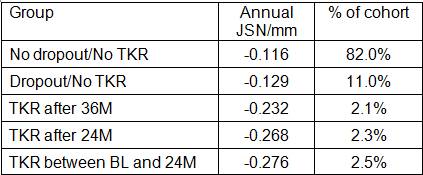Session Information
Session Type: Abstract Submissions (ACR)
Impact of dropout and TKR on Joint Space Narrowing estimation: data from Osteoarthritis Initiative
Background/Purpose: Structural progression in knee osteoarthritis (OA) is often measured by Joint Space Narrowing (JSN). In longitudinal studies, it is common for subjects to drop out before the scheduled end of follow-up. In OA, subjects might undergo total knee replacement (TKR), and consequently drop out of a study evaluating structural progression. Our objective was to estimate the impact of dropout due to TKR on estimates of structural progression in OA and investigate whether information about TKR could be used to improve these estimates.
Methods: We used data from the Osteoarthritis Initiative (OAI), a multicenter, longitudinal, observational study of knee OA. We selected knees with radiographic, symptomatic OA at baseline (KL ≥ 2, WOMAC Pain>0), selecting the knee with the worst pain for subjects with two knees with OA. We compared the estimate of change in JSN over time in persons who did and who did not undergo TKR. Further, we estimated JSN without taking into account dropout and compared to the model that took into consideration time of the dropout and timing of TKR among those that underwent TKR.
Results: We used data from 2,058 subjects with radiographic, symptomatic knee OA at baseline. 377 subjects (18%) dropped out before the 48 month visit; 231 dropped out and did not undergo TKR while 146 underwent TKR. Among those who had TKR, they were distributed evenly between 24, 36 and 48 months visits. The estimates of annual joint space narrowing ranged from 0.116 mm for those who completed the 48 month follow up to 0.28 among those who had TKR between baseline and 24 months visit (Table). Additional analyses showed that not accounting for dropout and TKRs led to underestimation of JSN (0.46 mm over 4 years) compared to the estimation of joint space narrowing using the model that took into consideration both timing of dropout and timing of TKR (0.51 mm over the course of 4 years).
Conclusion: In longitudinal studies restricting analysis to ‘completers’ may lead to underestimation of structural changes. Subjects with OA who drop out of the study to undergo TKR tend to have much more pronounced structural progression. Investigators studying disease progression in OA should consider the potential impact of dropout due to TKR, particularly when a large proportion of subjects undergo the procedure.
Table. Annual JSN stratified by dropout and timing of TKR
Disclosure:
J. E. Collins,
None;
E. Losina,
None.
« Back to 2014 ACR/ARHP Annual Meeting
ACR Meeting Abstracts - https://acrabstracts.org/abstract/impact-of-dropout-and-total-knee-replacement-on-joint-space-narrowing-estimation-data-from-osteoarthritis-initiaive/

